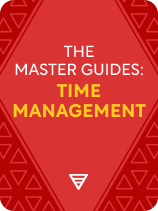

This article is an excerpt from the Shortform book guide to "The Master Guides: Time Management" by Shortform. Shortform has the world's best summaries and analyses of books you should be reading.
Like this article? Sign up for a free trial here.
Are you feeling overwhelmed by your daily tasks? Do you struggle to find time for activities you truly enjoy?
Time management isn’t just about productivity; it’s about enhancing your quality of life. After all, you are not a machine. We’ll explore modern attitudes about time scarcity, making room for enjoyable activities, and accepting that time isn’t entirely controllable.
Keep reading to discover how to balance productivity with personal fulfillment and find a healthier approach to managing your time.
You Are Not a Machine
In The Now Habit, Neil Fiore argues that you can avoid procrastination if you design your schedule so you can enter a state of flow—a feeling of enhanced calm, concentration, and creativity. The psychological benefits of flow illustrate the most important point to remember when managing your time—you are not a machine. The ultimate goal of time management isn’t just increased efficiency; it’s finding a way to improve your quality of life. We’ll discuss modern attitudes about the scarcity of time, how to make room for activities you enjoy, and why it’s healthy to acknowledge that time will never be completely under your control.
In Do Nothing, Celeste Headlee says that, though people today aren’t working longer hours than we did during the Industrial Revolution, we still feel exhausted and overworked. This is partly because as hourly wages and salaries increase, we perceive our time as more valuable, and as a consequence, it also feels more scarce. Thus, we feel anxiety at the prospect of wasting time and being unproductive, so even when we’re not at work, we feel we should still engage in some form of self-improvement or advancement.
Headlee’s first piece of advice is to do more focused work so that you can work fewer hours while getting the same amount done. If you have flexibility in your schedule, consider working for about 50 minutes at a time, followed by a 10- to 15-minute break to recharge. Another option is the Pomodoro technique of working in focused 25-minute work sessions, followed by five-minute breaks, with longer 15- to 30-minute breaks after every four focused-work cycles. Whichever strategy you use, Headlee also suggests not working any more than your job requires. The stress and exhaustion from being overworked isn’t worth the career benefits you may or may not receive for your efforts.
Perhaps even placing work first is a mistake. Neil Fiore argues that you should plan your week around your leisure time. Start by writing down specific appointments and necessary activities, then add scheduled leisure time, including play, socializing, hobbies, and self-care. Fiore recommends at least half an hour of recreation or relaxation per day, as well as dedicating one day per week entirely free of work. This improves your free time and work time, since putting leisure first lets you see how little time for work you actually have—which in turn motivates you to make the most of it. Fiore says that this approach lets you take time to play and not feel guilty for it.
Letting Go of Time
As much as you try to manage your schedule, total control over your time is impossible. In Four Thousand Weeks, Oliver Burkeman argues that, the more tasks you complete, the more tasks will appear to occupy your newly freed-up time. Similarly, if you accelerate your pace at work to complete all your tasks more quickly, you’ll feel forced to increase that acceleration in the future. This is because, in our productivity-focused world, expectations only go up—they never go down unless something goes wrong. For the sake of your energy and your mental health, prioritize only those tasks that matter most. Don’t take on more than you can handle, and be open to the future veering away from what you’ve planned.
Finally, Burkeman says that, once you accept that you’ll never wield total control over your time, you should align your schedule with the schedules of the people you want to spend time with. Even though structuring your free time around other people’s schedules initially seems restrictive, you’ll be much happier and feel less isolated. After all, the point of time management isn’t to bend time to your will—it’s to let you enjoy the time that you have as much and as often as you can.
Exercise: How Can You Make Better Use of Your Time?
Experts on time management agree that it’s important to identify your most important tasks, keep track of how you spend your time, and develop strategies to stave off procrastination, whether self-induced or otherwise. Think about how you manage your time at present and what you can do to manage it more effectively.
- Make a list of the things you hope to accomplish tomorrow. Which one or two items will help you the most when it comes to achieving your larger lifetime goals? Are there any items on the list that you can delegate to others or not do at all?
- Make a list of the main things you did yesterday. Which items did you spend the most time on? Were they the most valuable things you could have done, or did they displace something important off your list?
- Based on your previous answers, what can you do tomorrow to prevent a less relevant but time-consuming task from usurping the time you’d like to devote to the most important items on your to-do list?

———End of Preview———
Like what you just read? Read the rest of the world's best book summary and analysis of Shortform's "The Master Guides: Time Management" at Shortform.
Here's what you'll find in our full The Master Guides: Time Management summary:
- Experts’ advice for prioritizing what you spend your time on
- How to use bullet journals to track your time
- The emotional culprit behind procrastination






